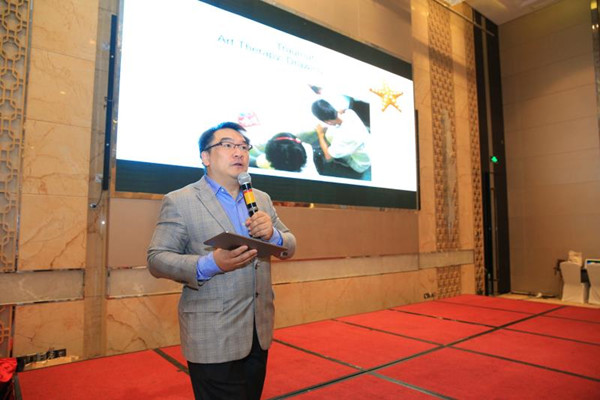Sacrificing riches to help AIDS impacted children
- By Wu Jin
 0 Comment(s)
0 Comment(s) Print
Print E-mail China.org.cn, August 21, 2018
E-mail China.org.cn, August 21, 2018
It may seem powerless to help the droves of starfish stranded along the beach. However, for the starfish that is saved, no other hand could be dearer than the one which helps the sea creature escape death.

The starfish metaphor illustrates the efforts of To Chung, a financier-turned philanthropist, who has helped about 23,000 AIDS-impacted children in China's most underdeveloped regions to grow up with confidence, knowledge, faith and dignity.
Twenty years on, the Chi Heng Foundation, a non-governmental organization (NGO) established by To, has become a certified overseas NGO recognized by the Chinese government in Dec. 18, 2017, for its commitment to providing hope and aspirations for disenfranchised young lives.
Over the past two decades, the foundation has been dedicated to sending AIDS-impacted children to school, launching educational video programs for remote teaching, organizing annual trips to big cities, including, Beijing, Shanghai and Guangzhou and offering job opportunities, such as in, Shanghai's Village 127, the cafe, named after the number of the first young beneficiaries financed and assisted by the foundation.
Before becoming a philanthropist, To, a graduate from Colombia University with a masters from Harvard University, was a talented star rising among highly-paid Wall-Street financers, earning millions of dollars each year and attending numerous high-end parties, banquets, exhibitions and concerts, often exclusively for celebrities.
However, in 1998, To was stunned by a completely different facet of life while visiting a destitute family in Shangcai, a poverty-stricken village in Henan province. In the derelict house, To and his colleagues were astonished to find a skinny boy lying on the ground, who, according to his mother, was dying of AIDS.
"In my previous life, the people surrounding me are healthy, well dressed and talented, who have high-paid jobs and live quality lives. I was living in an illusion that all people around the world live in such a glamorous way," To said while addressing the China Europe International Business School in June.
"However, the trips to the areas heavily affected by AIDS made me realize that my achievements in life were not just because I worked hard - but because I am lucky. From then on, I started to become aware of how AIDS is affecting people in the Chinese mainland…and decided to use my resources to help those less fortunate."
At the end of the last century, many people living in the country's undeveloped areas contracted AIDS through the re-use of unsterilized needles injected into different people, a practice rampant at numerous blood-selling stalls. The villagers never expected that the cost of contracting the lethal disease would offset the earnings made by selling blood, let alone drain their household savings, resulting in withdrawal from the labor force and their children becoming orphans.
This devastating scene of the boy on the floor deeply impacted To, who, after a sleepless night, decided to quit his prestigious job and devote all his time, fortune and energy to help the children in AIDS impacted families.
During his endeavors, To found that to change the fortunes of the children, they first needed to be healed from the traumatized hearts which have witnessed the deaths of their parents and discrimination caused by social stereotypes.
In helping them, To has not simply financed the children, but also encouraged them to dream big and become independent. He and his team introduced paintings to the children, inspiring them to set free their imagination and unleash their unbearable pain and agony through the palette of colors. He also set up a factory for local HIV positive women in Zhoukou village, Henan, to make cotton bags printed with the children's drawings and sell them as hotel souvenirs.
Moreover, the foundation also works with local authorities to spread the campaign for the Prevention of Mother-to-Child Transmission to ensure that the younger generation are protected.
"More than a decade ago, I took bread to feed the homeless children, who were starving. However, now, they have grown up and are able to bake their own bread. They have learned how to take care of those close to them and send love to others. Every time I think of that I am deeply touched," To said.
"During the past two decades that I have spent working on charitable causes, I have met many happy poor people as well as many wealthy sponsors, who, are often unhappy. So, I decided that all I need in my life is the pursuit of happiness, not fortune."






Go to Forum >>0 Comment(s)